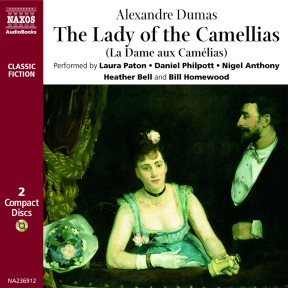
Audio Sample
Alexandre Dumas (fils)
The Lady of the Camellias
Read by Laura Paton, Daniel Philpott, Nigel Anthony, Heather Bell, Bill Homewood & Polly Hayes
abridged
The tragic but doomed love of Marguerite and Armand, recounted so passionately in La Dame aux Camélias, became one of the great love stories from its first publication in 1848. The title role of the consumptive heroine and her ultimate sacrifice inspired actresses from Sarah Bernhardt to Greta Garbo – and Giuseppe Verdi to write La Traviata. In this sound dramatisation, the story of passion and conflict is as fresh and compelling as when it was first written.
-
2 CDs
Running Time: 2 h 10 m
More product details
ISBN: 978-962-634-369-2 Digital ISBN: 978-962-954-523-9 Cat. no.: NA236912 Download size: 32 MB Produced by: Nicolas Soames Abridged by: Lesley Young BISAC: FIC004000 Released: December 2005 -
Listen to this title at Audible.com↗Listen to this title at the Naxos Spoken Word Library↗
Due to copyright, this title is not currently available in your region.
You May Also Enjoy
Cast
- Laura Paton
- Marguerite Gautier
- Daniel Philpott
- Armand Duval
- Nigel Anthony
- Narrator
- Heather Bell
- Prudence Duvernoy
- Bill Homewood
- Armand’s father
- Polly Hayes
- Julie Duprat/Olympe
Naxos Repertory: Anna Britten, Chris Larkin, Edward Rawle-Hicks, Benjamin Soames
Booklet Notes
Alexandre Dumas was born in 1824, the illegitimate son of Catherine Lebay, a dressmaker, and Alexandre Dumas, the author of The Three Musketeers and The Count of Monte Cristo. His parents lived together for only a short time after his birth, but his mother gave him a loving and secure home. Later his father sent him to boarding school; Dumas fils was very unhappy there and described his experiences in L’Affaire Clemenceau (1866).
Dumas fils left school in 1840 and went to live with his father, who was then at the height of his fame. He treated his son as a contemporary and together they threw themselves into the delights of bohemian society.
It was during this time that Dumas fils became the lover of Marie Dupleissis, a well- known courtesan who always wore white camellias. She had come to Paris as an uneducated, penniless country girl and had become the mistress of a string of men ascending from restaurateur to duke. She was swept off her feet by the refreshing youthfulness of Dumas’ passion but their liaison finished in 1846 just six months before Marie died of tuberculosis at the age of twenty-three.
Dumas had written Les Aventures de Quatre Femmes et d’un Perroquet in 1847, but it might as well have concerned a dead parrot for all the interest it aroused. The success of his second novel, La Dame aux Camélias, however, was immediate and sensational. In the book – written in three weeks – Dumas romanticized his love for Marie, and Paris society, which had followed her career with interest, was keen to read what was clearly a fictionalized account by her young lover.
Dumas adapted the novel for the stage the following year, but he had to wait three years before the censors allowed its performance. During the wait, Dumas wrote a clutch of novels with little success, but the production of La Dame aux Camélias at the Vaudeville in 1852 made his reputation. The play was a smash hit, and the next year Verdi was inspired to capture the passion of Armand and Marguerite, renamed Violetta, in his opera, La Traviata.
In 1855 Dumas’ Le Demi-Monde was the first play to tackle a social problem – in this case, the effects of prostitution on marriage. Dumas married Princess Narishkine, a Russian, and had two daughters, but later lived apart from his wife. In 1857 Dumas was made a member of the Académie Française. He published pamphlets on divorce and prostitution, which were influential in the revision of the French marriage laws.
In 1895 Dumas’ wife died and he married Mme. Regnier de la Brise, whom he had loved for many years. But in November of the same year Dumas died of meningitis. Although his output of plays and essays was prolific, it is for La Dame aux Camélias that Dumas is remembered. He was so moved by Sarah Bernhardt’s performance in the title role in 1884 that he gave her an early edition of the book and a letter he had written to Marie Dupleissis expressing regret that their love affair was doomed. He had ended the letter, ‘Mille souvenirs. A.D.’
Notes by Lesley Young




